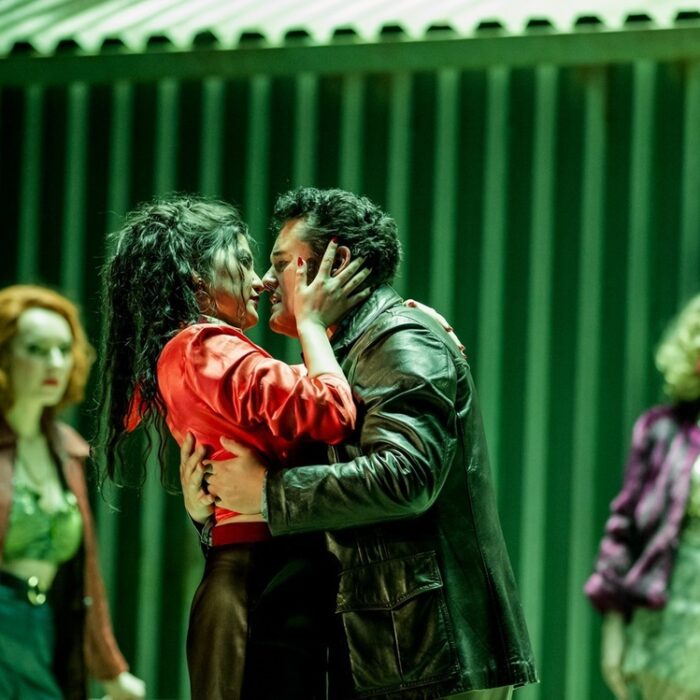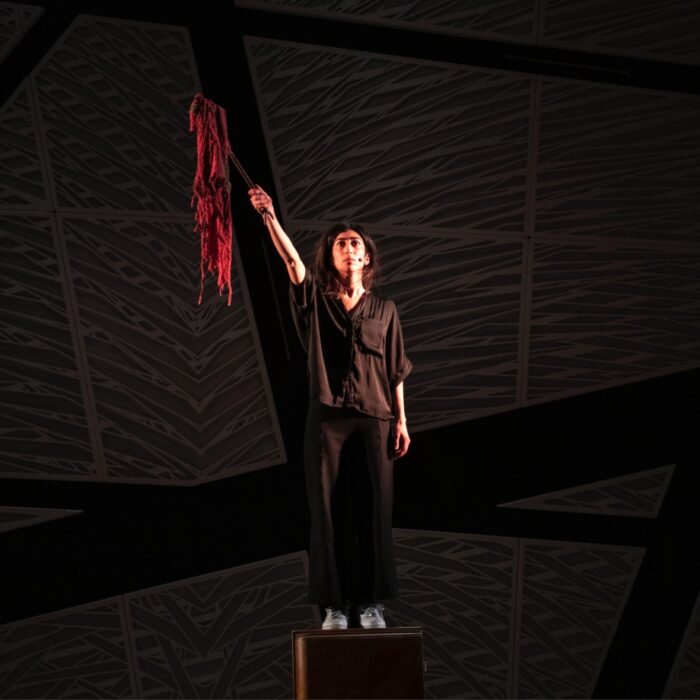
Cal Performances 2024 Review: Jakub Józef Orliński & Il Pomo d’Oro’s ‘Beyond’
By Lois Silverstein(Credit: Jiyang Chen)
It was a carnival. It was a class act. It was a festival. Yes, Jakub Jósef Orliński and Il Pomo d’Oro landed in UC Berkeley’s Zellerbach Hall for CAL Performances, and their performance was all those things. The 10 musicians of Il Pomo d’Oro entered the darkly-lit stage dressed in black satin coats. They took to their posts with an array of exotic early instruments, and in silence, gliding in upstage right, a tall, black satin cape-covered form: Orliński! countertenor par excellence. After a flick of his own black-satin and embroidered cape, a glorious sound emerged. It was pure, unadulterated, resonant, and beautiful. The instruments gathered around; and we were off!
BEYOND is a production of Baroque music of which Orliński says “I delve into the meaning of the word ‘beyond’, particularly in the sense that this music resonates beyond its own time. It is still relevant, still alive, vibrant, touching, engaging, and entertaining.” Beyond was created by Orliński, historical researcher, Yannis François and Il Pomo d’Oro, a group founded in 2012. Each member of Il Pomo d’Oro is an acclaimed specialist in historical performance. The group performs across Europe, and in the United States, where they also appeared with well-known American opera singer, Joyce DiDonato, and in productions such as “In War and Peace”, “My Favorite Things” and “Eden” in 2022-23, in Zellerbach Hall. In addition to their substantial discography, they serve as the official ambassador of El Sistema Greece, a humanitarian project that provides free musical education to children in Greek refugee camps.
What stood out in the performance was the ocean of sound that Orliński poured into the hall. This sound was rich with tonal immediacy. Through his unique presence, ever connecting through his movement with his wide-range of gesture and expression, he communicated specific and distinct musical beauty. As he proceeded, he seemed like a descendent of the remarkable albeit silent Marcel Marceau, with a touch of a Johnny Appleseed thrown in. He darted around the stage as he did, and around the audience, going from balcony to balcony, then sitting at the edge of the stage and making contact with those members of the audience right before him, allured by his every gesture. His aim, it seemed, was to take and keep us on the same journey he himself had taken, enchanting us with his exquisite sound, feeling, and sensation, as well as providing us with the world-view that inspired the music. Never did he simplify or reduce it to just a manageable format. Rather, he presented it with the multi-dimensional immediacy that made it easily accessible. It was distant yes, but he gave that distant music right to us.
The ensemble performed songs that included Monteverdi, Marini, Netti, Strozzi, Sartorio, among others, and included several instrumental pieces. They began with an extended section from Monteverdi’s “L’Incoranazione di Poppea” (1642) luxuriant tone and precise ringing out across the hall. Caccini’s “Amarilli, mia bella” followed with beautiful charm and piquancy. One by one, Frescobaldi, Kerll, Cavalli, Pallavicino, 17th century works, but not just in sequence. Through which Orliński “told” the story of love scorned and thwarted and the suffering of the “wretched heart”, that wretched heart that teetered on the edge of death from the cruel treatment he received from lady love. “Dolcissime catene, sweetest chains,” the oxymoron from Netti’s “La Filli” summed it up beautifully: “sempre v’adorero,” I will always adore you. “Costante nelle pene,” steadfast in my suffering. The stuff of long-lost lover and his beloved, dramatized, singing his way through the narrative, such as it was. Clearly, it was no opera. Conflict? Absent. Contrast? Minimum, the musicians accompanying or leading him. Opera was not the intention. Were it not for the glory of the sound and the conviction with which he delivered the message of his beloved’s constancy, “la constanza del tuo amore”, for instance, and our remembering that plot line was deliberately absent, the weight of sameness might have dragged the performance down.
But, the fastidiousness of the vocal line, the clarity of the diction and the rich imbedding of the persona with the emotion unfolding, trumped all of that. Indeed, the delight of the old lady song, Netti’s “Quanto più la donna invecchia” (1681) capped it well. There was Orlinski cape draped over his head portraying the old woman who, the more she aged, “più desiderata il marito”, the more she desired her husband, bringing the entire audience into gales of laughter. “Son vecchia, pazienza,/passò quellèta/che l’anime ardea,” I am old, sorry, the age has passed that fires our hearts”… the vocal and theatrical risk taken and savored. It was a delight.
Orliński sang the love story and danced the love story, in shoes and without, in high-jinxed breakdancing moments, in alternately somber and cheerful moods, from the floor, or up on a chair. Rhythmic shifts and changes, in the light and beside it, with the instruments or solo, amplified the texture. His moments with guitarist Miguel Rincón injected another kind of fresh moment into the long Baroque lines with some Blues, he and Orliński playing off each other in a brief change of mood.
Orliński sang with an honest dedication. He became the music and showed its many felicitous charms along with his own. So did Il Pomo d’Oro. His stage companions were equally committed, even through the dark landscape both musically and sensorily that they were creating, a small and sometimes wry smile appeared on many of their faces. They exuded joy!
The performance was designated to be 75 minutes long. The musicians offered four encores: Boretti, “Chi Scherza Con Amor” from Eliogabalo; Cavalli, “Lucidissima Face,” from La Calisto; Orlandini, “Che m’ami Ti Prega” from Nerone; Sartorio, “La Certezza Di Tua Fede” from Antonino E Pompeiano. With all they offered, we were there far longer, and might have stayed until dawn, what with Orliński’s enthusiasm and buoyant energy and that of Il Pomo d’Oro.


